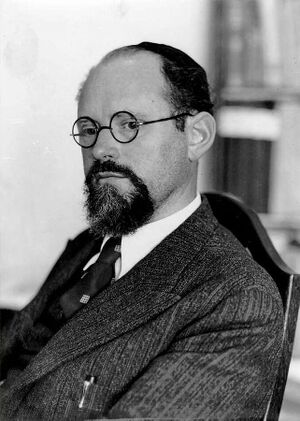Abraham Fraenkel (nonfiction): Difference between revisions
No edit summary |
No edit summary |
||
| (One intermediate revision by the same user not shown) | |||
| Line 1: | Line 1: | ||
[[File:Adolf_Abraham_Halevi_Fraenkel.jpg|thumb|Abraham Fraenkel.]]'''Abraham Halevi (Adolf) Fraenkel''' (Hebrew: אברהם הלוי (אדולף) פרנקל; February 17, 1891 – October 15, 1965), known as Abraham Fraenkel, was a German-born Israeli [[Mathematician (nonfiction)|mathematician]]. | [[File:Adolf_Abraham_Halevi_Fraenkel.jpg|thumb|Abraham Fraenkel.]]'''Abraham Halevi (Adolf) Fraenkel''' (Hebrew: אברהם הלוי (אדולף) פרנקל; February 17, 1891 – October 15, 1965), known as Abraham Fraenkel, was a German-born Israeli [[Mathematician (nonfiction)|mathematician]]. | ||
Fraenkel's early work was on [[Kurt Hensel (nonfiction)|Kurt Hensel]]'s p-adic numbers and on the theory of rings. He is best known for his work on axiomatic set theory, publishing his first major work on the topic ("Einleitung in die Mengenlehre") in 1919. In 1922 and 1925, he published two papers that sought to improve [[Ernst Zermelo (nonfiction)|Zermelo]]'s axiomatic system; the result is the Zermelo–Fraenkel axioms. Fraenkel worked in set theory and foundational mathematics. | Fraenkel's early work was on [[Kurt Hensel (nonfiction)|Kurt Hensel]]'s p-adic numbers and on the theory of rings. He is best known for his work on axiomatic set theory, publishing his first major work on the topic ("Einleitung in die Mengenlehre") in 1919. In 1922 and 1925, he published two papers that sought to improve [[Ernst Zermelo (nonfiction)|Ernst Zermelo]]'s axiomatic system; the result is the Zermelo–Fraenkel axioms. Fraenkel worked in set theory and foundational mathematics. | ||
Fraenkel also was interested in the history of mathematics, writing in 1920 and 1930 about Gauss's works in algebra, and he published a biography of [[Georg Cantor (nonfiction)|Georg Cantor]]. | Fraenkel also was interested in the history of mathematics, writing in 1920 and 1930 about Gauss's works in algebra, and he published a biography of [[Georg Cantor (nonfiction)|Georg Cantor]]. | ||
| Line 30: | Line 30: | ||
[[Category:Nonfiction (nonfiction)]] | [[Category:Nonfiction (nonfiction)]] | ||
[[Category:History of mathematics (nonfiction)]] | |||
[[Category:Mathematicians (nonfiction)]] | [[Category:Mathematicians (nonfiction)]] | ||
[[Category:People (nonfiction)]] | [[Category:People (nonfiction)]] | ||
[[Category:Set theory (nonfiction)]] | [[Category:Set theory (nonfiction)]] | ||
Latest revision as of 09:19, 29 November 2017
Abraham Halevi (Adolf) Fraenkel (Hebrew: אברהם הלוי (אדולף) פרנקל; February 17, 1891 – October 15, 1965), known as Abraham Fraenkel, was a German-born Israeli mathematician.
Fraenkel's early work was on Kurt Hensel's p-adic numbers and on the theory of rings. He is best known for his work on axiomatic set theory, publishing his first major work on the topic ("Einleitung in die Mengenlehre") in 1919. In 1922 and 1925, he published two papers that sought to improve Ernst Zermelo's axiomatic system; the result is the Zermelo–Fraenkel axioms. Fraenkel worked in set theory and foundational mathematics.
Fraenkel also was interested in the history of mathematics, writing in 1920 and 1930 about Gauss's works in algebra, and he published a biography of Georg Cantor.
He was an early Zionist and the first Dean of Mathematics at the Hebrew University of Jerusalem.
After retiring from the Hebrew University and being succeeded by his former student Abraham Robinson, Fraenkel continued teaching at the Bar Ilan University in Ramat Gan (near Tel Aviv).
In the News
Fiction cross-reference
Nonfiction cross-reference
- Georg Cantor (nonfiction)
- Kurt Hensel (nonfiction)
- Mathematics (nonfiction)
- Ernst Zermelo (nonfiction)
External links:
- Abraham Fraenkel @ Wikipedia
